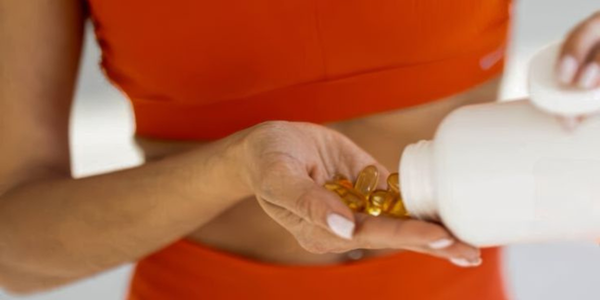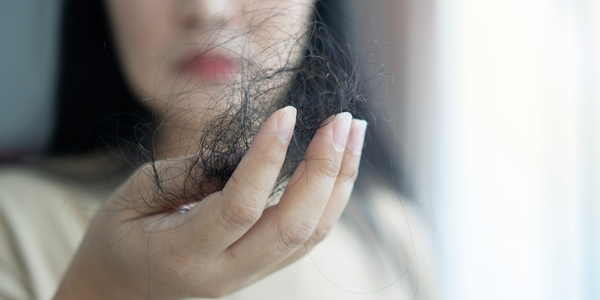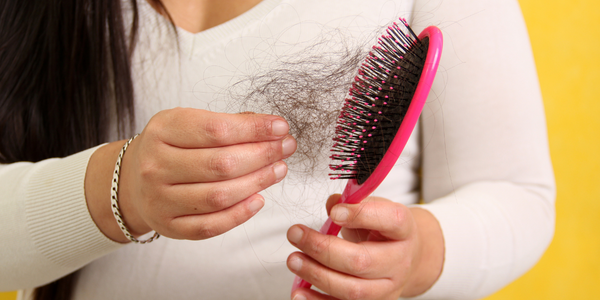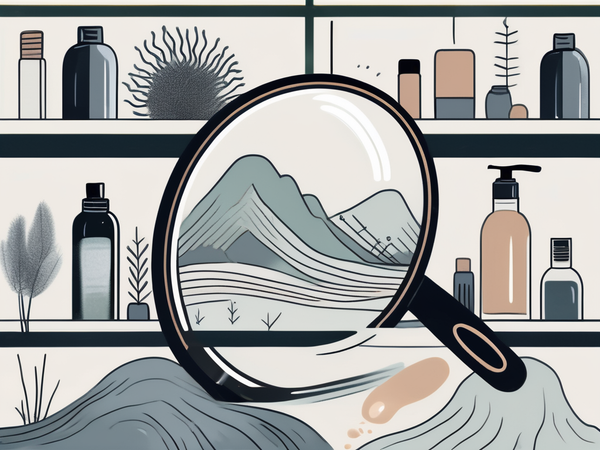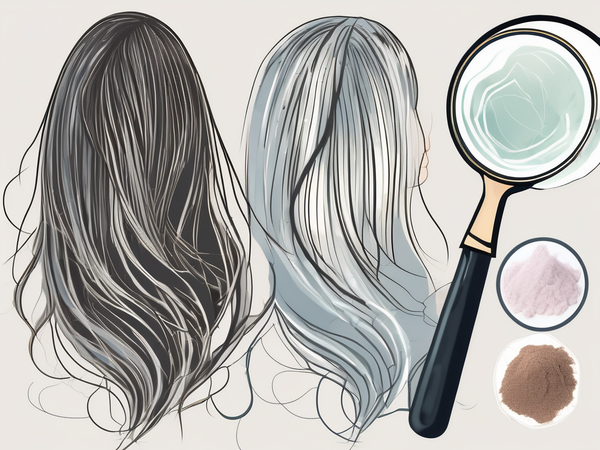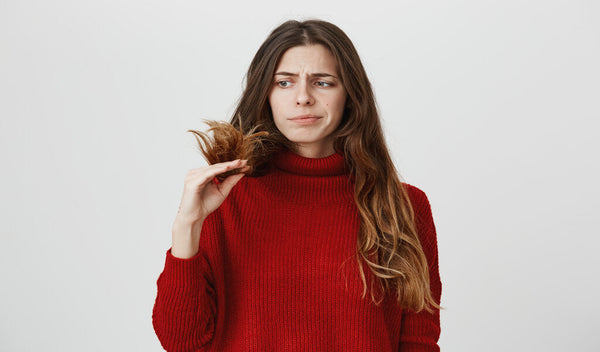
What is Biotin?
Biotin is a water-soluble vitamin B that is vital for human health. It is also known as Vitamin H or B7 and is essential for a variety of metabolic processes in the body, such as the synthesis of glucose, fatty acids, and amino acids. Biotin also aids in the conversion of food into energy, the synthesis of hormones, and the maintenance of healthy skin, hair, and nails. It can be found in a range of foods, including egg yolks, liver, yeast, and whole grain cereals, as well as in dietary supplements.
The Importance of Biotin for Hair Health
While we all know biotin as vitamin B7, it is also known as "Vitamin H," where "H" stands for "Haar" and "Haut," which are German words for "skin" and "hair," respectively. Biotin plays an important role in stimulating keratin production in your hair to boost follicle growth and strengthen it from within, thereby reducing hair fall and supporting the growth of your hair follicles. It further strengthens your hair by reducing breakage.
Using a variety of shampoos, conditioners, or masks with several chemicals may not help your hair as much as ingesting vitamins and minerals. "You are what you eat" and so is your hair. With the rising intake of fast food and processed foods, the body loses out on these essential nutrients. Hence, it is necessary to consume foods that are rich in elements that are essential for your hair growth and overall well-being. Needless to say, biotin is one of these nutrients that should be a must in your diet.
Causes of Biotin Deficiency
Biotin deficiency is relatively rare but can be caused by several factors, including the following:
1. Biotin deficit:
A diet deficient in biotin-rich foods such as eggs, nuts, seeds, and whole grains might result in biotin insufficiency.
2. Excessive alcohol consumption:
Alcohol can prevent biotin and other vitamins and minerals from being absorbed, resulting in a deficit.
3. Certain drugs:
Drugs, such as anticonvulsants and antibiotics, might impair the body's ability to absorb biotin, resulting in insufficiency.
4. Inherent disorders and diseases:
Some people have genetic disorders that impair their capacity to absorb biotin from meals, resulting in a deficit.
5. Consumption of raw egg whites in excess:
Raw egg whites include a protein called avidin, which binds to biotin and prevents it from being absorbed by the body. Consuming a lot of raw egg whites might cause a biotin deficit.
6. Pregnancy and lactation:
Pregnant and breastfeeding women require more biotin. They may develop a deficiency if they do not consume enough biotin-rich foods or take a biotin supplement.
7. Inflammatory bowel disease (IBD):
IBD is characterized by diarrhea and malabsorption of nutrients, including biotin, thus causing a deficiency.
Symptoms of Biotin Deficiency
A lack of biotin can result in a variety of symptoms, including the following:
- Skin irritation or rash around the eyes, nose, mouth, and genital area
- Brittle or missing nails
- Hair thinning or loss
- Skin that is dry and scaly
- Weakness and fatigue
- Depression and appetite loss
- Numbness and tingling in the arms and legs
- Muscle aches and cramps
- Anemia (low red blood cell count) (low red blood cell count)
- Shortness of breath and increased heart rate
How Does Your Body Get its Share of Biotin?
The human body cannot produce biotin, so it can only be supplemented orally through the foods you eat. Additionally, biotin is a water-soluble vitamin that doesn’t get stored and, hence, needs to be consumed regularly to meet the body’s ever-increasing nutrient requirement. Biotin-rich foods include the following:
- Egg yolk
- Pork liver
- Oat flakes
- White Mushrooms
- Nuts and seeds
- Rice
- Legumes
- Sweet Potatoes
- Bananas
- Cruciferous vegetables like broccoli, cabbage, cauliflower, etc.
- Avocados
- Yeast
Including these biotin-rich foods in your diet will help you on your journey to achieving healthy hair. If you are unable to meet your body's biotin requirements for whatever reason, you may turn to biotin supplements on the market. Apart from traditional oral pills and gummies, these days, an advanced form of supplement is available in the form of thin oral strips that quickly melt in your mouth, saving you time while providing you with highly bioavailable nutrients. These supplements contain biotin along with other nutrients like zinc and folic acid to improve hair growth and help you achieve your hair goals faster.
Health Benefits of Biotin
Biotin, offers numerous health advantages, including the following:
- Biotin for skin and hair: It is essential for the health of the skin, hair, and nails, and a shortage of biotin can result in hair loss, brittle nails, and skin rashes.
- Maintains healthy blood sugar levels: Biotin has been demonstrated to improve insulin sensitivity and lower blood sugar levels in type 2 diabetics.
- Promotes nerve health: Biotin is important in the generation of nerve transmitters, and a lack of biotin has been related to nerve injury and peripheral neuropathy.
- Biotin in pregnancy and lactation: It is essential for fetal growth, and a biotin shortage during pregnancy has been related to an increased risk of birth abnormalities.
- Boosts energy levels: Biotin aids in the conversion of food into energy and is involved in the metabolism of lipids and carbohydrates, all of which can contribute to increased energy levels.
- Increases enzyme efficiency: Biotin aids in utilizing enzymes and carrying nutrients throughout the body.
- Eye Health: It helps prevent macular degeneration (vision impairment).
- Detoxification: Biotin aids in the detoxification and improvement of liver function, particularly in those with non-alcoholic fatty liver disease and liver cirrhosis.
Possible Side Effects of Biotin
Biotin is considered safe for most people when taken in recommended doses. However, high doses of biotin can cause some side effects, including the following:
1. Interference with laboratory tests:
High amounts of biotin can interfere with certain laboratory tests, such as thyroid hormone testing and some cancer indicators, resulting in misleading results.
2. Digestive symptoms:
High amounts of biotin may produce gastric troubles such as bloating, gas, and diarrhea.
3. Allergic reactions:
Some people may be allergic to biotin, resulting in symptoms such as skin rashes, itching, and difficulty breathing.
4. Drug interactions:
Biotin may interfere with some medications, such as anticonvulsants, antibiotics, and cholesterol-lowering agents. It is therefore critical to consult with a healthcare expert, before taking biotin if you are currently taking any prescribed medications.
Recommended Daily Dosages
Biotin supplements should be taken in the suggested amounts, which normally range from 30 to 100 mcg per day. Taking large amounts of biotin without medical supervision is not advised. If you suffer any negative side effects while taking biotin, it is advised that you discontinue its use and consult a healthcare practitioner.
Wrapping Up
The self-care market is tapping into consumers’ distressed state of mind over their hair quality, resulting in a plethora of hair care products flooding the shelves. From shampoos that cater to a specific hair type to masks for everyone, you name it, and they have it. However, if the root cause of your hair health issues is a lack of biotin, these topical or external hair care products will be of no benefit other than giving you a placebo effect. While you may additionally opt for topical solutions, remember to also nourish your hair from within by ensuring adequate intake of this essential vitamin B7 (biotin) through foods or supplements.
References:
● DiMarco G, McMichael A. Hair Loss Myths. J Drugs Dermatol. 2017 Jul 1;16(7):690-694. PMID: 28697221, (https://pubmed.ncbi.nlm.nih.gov/28697221/)
● Said HM. Biotin: biochemical, physiological and clinical aspects. Subcell Biochem. 2012;56:1-19. doi: 10.1007/978-94-007-2199-9_1. PMID: 22116691. (https://pubmed.ncbi.nlm.nih.gov/22116691/)
● Patel DP, Swink SM, Castelo-Soccio L. A Review of the Use of Biotin for Hair Loss. Skin Appendage Disord. 2017;3(3):166-169. doi:10.1159/000462981. (https://www.ncbi.nlm.nih.gov/pmc/articles/PMC5582478/)
● Lipner SR. Rethinking biotin therapy for hair, nail, and skin disorders. J Am Acad Dermatol. 2018 Jun;78(6):1236-1238. doi: 10.1016/j.jaad.2018.02.018. Epub 2018 Feb 10. PMID: 29438761. (https://pubmed.ncbi.nlm.nih.gov/29438761/)
● Biotin, National Institute of Health, (https://ods.od.nih.gov/factsheets/Biotin-HealthProfessional/)
● Hemmati M, Babaei H, Abdolsalehei M. Survey of the effect of biotin on glycemic control and plasma lipid concentrations in type 1 diabetic patients in kermanshah in iran (2008-2009). Oman Med J. 2013;28(3):195-198. doi:10.5001/omj.2013.53. ( https://www.ncbi.nlm.nih.gov/pmc/articles/PMC3679599/)
● Abramson DH, Abramson HS. High-Dose Supplements for Age-Related Macular Degeneration: Did You Leave Out Centrum? Arch Ophthalmol. 2002;120(11):1602. (https://jamanetwork.com/journals/jamaophthalmology/article-abstract/272777)
● Zempleni J, Wijeratne SS, Hassan YI. Biotin. Biofactors. 2009;35(1):36-46. doi:10.1002/biof.8. (https://www.ncbi.nlm.nih.gov/pmc/articles/PMC4757853/#)














